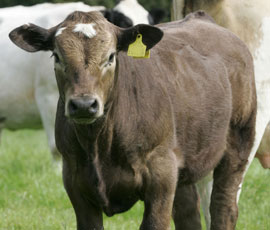VIDEO: Study probes cryptosporidiosis rise

A new study is under way to find out what is causing an increase in cases of cryptosporidiosis in beef suckler herds – a problem which has resulted in more than 10% calf mortality on some farms.
Following calls for help from farmers in the north east of Scotland, researchers at the Moredun Institute in Edinburgh, are looking into the different types of Cryptosporidium shed by farm livestock with the aim of providing information on how to control the parasite load into the environment.
In partnership with Quality Meat Scotland, the Scottish government, Glasgow University and the Cryptosporidiosis Reference Unit in Swansea, a survey was carried out on 40 beef suckler herds in the north east of Scotland, with farmers being asked what their treatment strategy was for the disease.
Preliminary results from the survey suggest there is no clear relationship between management practices, farm characteristics and the level of disease seen on the 40 farms.
However, it was noted that Cryptosporidium parvum – the parasite often associated with disease in neonatal livestock and a cause of disease in people – was present in calf faecal samples from 74% of the farms tested.
The samples are now being tested to sub species level to determine whether or not there are specific genetic types of the parasite that are more pathogenic than others.
Moredun’s Lee Innes said: “Cryptosporidiosis is endemic, and it’s becoming an increasing problem, particularly in beef suckler herds. It is passed by a faecal oral route between animals, and one animal infected with ten of these eggs will shed one billion parasites back into the environment.”
To lower the risk of the disease, which currently has no effective vaccine against it, she recommended cleaning out pens, post-calving, with ammonia-based products.
• For more information on best practice youngstock management, including how to prevent scours, visit www.fwi.co.uk/stoptheloss
